
Schleswig-Holstein is the northernmost of the 16 states of Germany, comprising most of the historical Duchy of Holstein and the southern part of the former Duchy of Schleswig. Its capital city is Kiel; other notable cities are Lübeck and Flensburg.

Caspar Rudolph Ritter von Jhering was a German jurist. He is best known for his 1872 book Der Kampf ums Recht, as a legal scholar, and as the founder of a modern sociological and historical school of law. His ideas were important to the subsequent development of the "jurisprudence of interests" in Germany.

Siegfried Helferich Richard Wagner was a German composer and conductor, the son of Richard Wagner. He was an opera composer and the artistic director of the Bayreuth Festival from 1908 to 1930.

Neumünster is a city in the middle of Schleswig-Holstein, Germany. With more than 79,000 registered inhabitants, it is the fourth-largest municipality in Schleswig-Holstein. The Holstenhallen and the Stadthalle make the city an important trade fair location.

The Hamburg S-Bahn is a suburban commuter railway network in the Hamburg Metropolitan Region. Together, the S-Bahn, the Hamburg U-Bahn, the AKN railway and the regional railway form the backbone of railway public transport in the city and the surrounding area. The network has operated since 1907 as a commuter rail system, under the direction of the state railway, and is a member of the Hamburger Verkehrsverbund. There are six lines, serving 68 stations, on 147 kilometres (91 mi) of route. On an average working day the S-Bahn transports about 590,000 passengers; in 2010 about 221 million people used the S-Bahn.

Elmshorn is a town in the district of Pinneberg in Schleswig-Holstein in Germany. It is 30 km north of Hamburg on the small river Krückau, a tributary of the Elbe, and with about 50,000 inhabitants is the sixth-largest town in the state of Schleswig-Holstein, Germany. It is the birthplace of writer and editor Hermann Schlüter (1851–1919), the mathematician Hermann Weyl (1885–1955) and the medievalist Heinz Woehlk.

Reemtsma Cigarettenfabriken GmbH is one of the biggest tobacco and cigarette manufacturing companies in Europe and a subsidiary of Imperial Brands. The company's headquarters is in Hamburg, Germany.
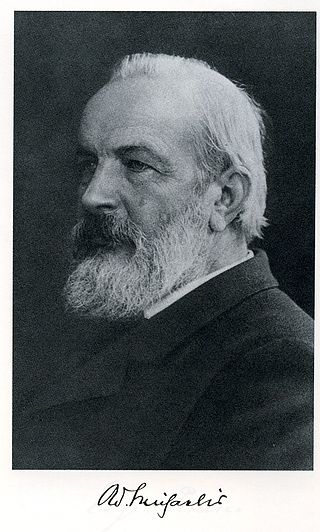
Adolf Michaelis was a German classical scholar, a professor of art history at the University of Strasbourg from 1872, who helped establish the connoisseurship of Ancient Greek sculpture and Roman sculpture on their modern footing. Just at the cusp of the introduction of photography as a tool of art history, Michaelis pioneered supplementing his descriptions with sketches.
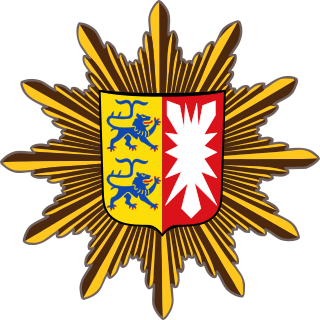
Schleswig-Holstein Police is a state law-enforcement agency in Schleswig-Holstein, Germany. It is subordinated to the Schleswig-Holstein Ministry of the Interior, Municipal Affairs, Housing and Sports.

The Marsh Railway is a main line in the state of Schleswig-Holstein in Germany that links the stations of Elmshorn in the south and Westerland on the island of Sylt in the north. It is part of 237 km (147 mi) long route from Hamburg-Altona to Westerland (Sylt) and is listed in the Deutsche Bahn timetables as Kursbuchstrecke 130. The first part of it was opened in 1845 and is one of the oldest lines in Germany.
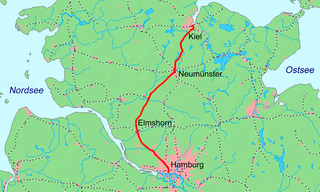
The Hamburg-Altona–Kiel railway is one of the most important main line railways of the states of Schleswig-Holstein and Hamburg in Northern Germany. The line runs through the region of Holstein and connects the cities of Hamburg, Elmshorn, Neumünster and Kiel. The 105 km (65 mi) long standard gauge double track electrified railway line is now owned by DB Netz.
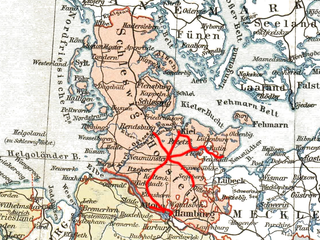
The Altona-Kiel Railway Company was a joint-stock company, established under the law of Denmark in personal union with the Duchy of Holstein, that built and operated an 105 km railway line between Altona and the Baltic Sea port city of Kiel. Altona was at that time the second largest city under Danish rule and the railway line was the first built in Danish-controlled territory.
Prizes are promotional items—small toys, games, trading cards, collectables, and other small items of nominal value—found in packages of brand-name retail products that are included in the price of the product with the intent to boost sales, similar to toys in kid's meals. Collectable prizes produced in series are used extensively—as a loyalty marketing program—in food, drink, and other retail products to increase sales through repeat purchases from collectors. Prizes have been distributed through bread, candy, cereal, cheese, chips, crackers, laundry detergent, margarine, popcorn, and soft drinks. The types of prizes have included comics, fortunes, jokes, key rings, magic tricks, models, pin-back buttons, plastic mini-spoons, puzzles, riddles, stickers, temporary tattoos, tazos, trade cards, trading cards, and small toys. Prizes are sometimes referred to as "in-pack" premiums, although historically the word "premium" has been used to denote an item that is not packaged with the product and requires a proof of purchase and/or a small additional payment to cover shipping and/or handling charges.

Carl Moritz was a German architect and real-estate entrepreneur. Based in Cologne, he built the Cologne Opera House of 1902, and various banks, theatres and churches in Germany. Some of his buildings were destroyed during the last two years of his life in World War II.

The Elmshorn–Bad Oldesloe railway is a regional railway line that has existed since 1896 in the south of the German state of Schleswig-Holstein. It has been operated since 1981 by the AKN Eisenbahn.

The terms Danish March and March of Schleswig are used to refer to a territory in modern-day Schleswig-Holstein north of the Eider and south of the Danevirke. It was established in the early Middle Ages as a March of the Frankish Empire to defend against the Danes. The term "Danish March" is a modern designation not found in mediaeval sources. According to the Royal Frankish Annals, the Danish King led his troops "into the March" in 828. In the 852 Yearbook of Fulda, there is mention of a "Guardian of the Danish Border".

Jakob Blasel is a German climate activist and politician of Alliance 90/The Greens.

Hermann Howaldt was a German engineer and entrepreneur; co-founder and board member of "Howaldtswerke AG", now Howaldtswerke-Deutsche Werft (HDW).
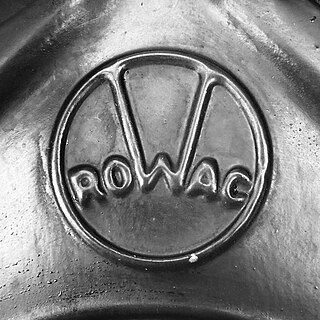
Rowac was a hardware factory founded by Carl Robert Wagner in 1888 in Chemnitz, Germany which most notably produced furniture for industrial use. Carl Robert Wagner is regarded as the inventor of the steel stool, which among other things was chosen for the workshops and classrooms of the Bauhaus Dessau. Today, mainly stools, chairs and cabinets carrying the Rowac name are traded as antiques.



















